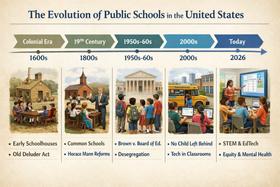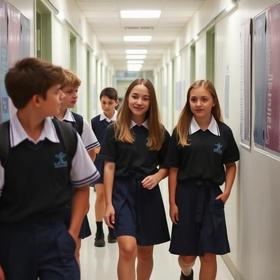Serving 301 students in grades Prekindergarten-5, Taylor Elementary School ranks in the top 50% of all schools in Colorado for overall test scores (math proficiency is top 50%, and reading proficiency is top 50%).
The percentage of students achieving proficiency in math is 35-39% (which is higher than the Colorado state average of 33%). The percentage of students achieving proficiency in reading/language arts is 45-49% (which is approximately equal to the Colorado state average of 45%).
The student-teacher ratio of 15:1 is equal to the Colorado state level of 15:1.
Minority enrollment is 13% of the student body (majority Hispanic), which is lower than the Colorado state average of 50% (majority Hispanic).
Quick Facts (2026)
- Grades: Prekindergarten-5
- Enrollment: 301 students
- Student-Teacher Ratio: 15:1
- Minority Enrollment: 13%
- Overall Testing Rank: Top 50% in CO
- Math Proficiency: 35-39% (Top 50%)
- Reading Proficiency: 45-49% (Top 50%)
- Source: National Center for Education Statistics (NCES), CO Dept. of Education
School Overview
Taylor Elementary School's student population of 301 students has declined by 10% over five school years.
The teacher population of 20 teachers has declined by 9% over five school years.
Grades Offered
Grades Prekindergarten-5
(No virtual instruction)
(No virtual instruction)
Total Students
301 students
Gender %
Total Classroom Teachers
20 teachers
Last Day of School
Mon. May 25, 2026
School Rankings
Taylor Elementary School ranks within the top 50% of all 1,748 schools in Colorado (based off of combined math and reading proficiency testing data).
The diversity score of Taylor Elementary School is 0.23, which is less than the diversity score at state average of 0.62. The school's diversity has stayed relatively flat over five school years.
Overall Testing Rank
#686 out of 1748 schools
(Top 50%)
(Top 50%)
Math Test Scores (% Proficient)
35-39%
33%
Reading/Language Arts Test Scores (% Proficient)
45-49%
45%
Student-Teacher Ratio
15:1
15:1
American Indian
1%
1%
Asian
n/a
3%
Hispanic
11%
36%
Black
n/a
5%
White
87%
50%
Hawaiian
n/a
n/a
Two or more races
1%
5%
All Ethnic Groups
Eligible for Free Lunch
38%
39%
Eligible for Reduced Lunch
7%
6%
School Statewide Testing
School District Name
Source: National Center for Education Statistics (NCES), CO Dept. of Education
Frequently Asked Questions
What is Taylor Elementary School's ranking?
Taylor Elementary School is ranked #686 out of 1,748 schools, which ranks it among the top 50% of public schools in Colorado.
What schools are Taylor Elementary School often compared to?
Taylor Elementary Schoolis often viewed alongside schools like New Emerson School At Columbus, Mesa View Elementary School by visitors of our site.
What percent of students have achieved state testing proficiency in math and reading?
35-39% of students have achieved math proficiency (compared to the 33% CO state average), while 45-49% of students have achieved reading proficiency (compared to the 45% CO state average).
How many students attend Taylor Elementary School?
301 students attend Taylor Elementary School.
What is the racial composition of the student body?
87% of Taylor Elementary School students are White, 11% of students are Hispanic, 1% of students are American Indian, and 1% of students are Two or more races.
What is the student-teacher ratio of Taylor Elementary School?
Taylor Elementary School has a student ration of 15:1, which is equal to the Colorado state average of 15:1.
What grades does Taylor Elementary School offer ?
Taylor Elementary School offers enrollment in grades Prekindergarten-5 (No virtual instruction).
What school district is Taylor Elementary School part of?
Taylor Elementary School is part of Mesa County Valley School District No. 51.
School Reviews
Review Taylor Elementary School. Reviews should be a few sentences in length. Please include any comments on:
- Quality of academic programs, teachers, and facilities
- Availability of music, art, sports and other extracurricular activities
Recent Articles

Do We Still Need Libraries in Public Schools in 2026
An updated look at the role of public school libraries in 2026, their impact on literacy, equity, and digital learning, and why they remain essential today.

The History of Public Schools in the United States
Explore the history of public schools in the U.S., from colonial roots to 2026 reforms shaping equity, funding, and classroom innovation.

Special-Program Registration Deadlines Explained
Learn what to know about special-program registration deadlines for magnet, CTE, and dual-enrollment options in public schools.





